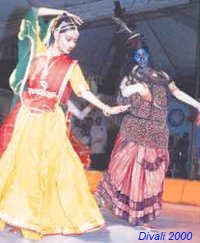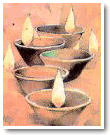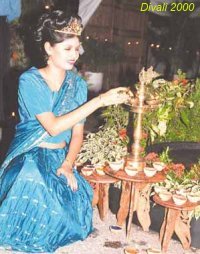Divali (Deepavali)

 Divali (Diwali, Deepavali) is the Festival of Lights that symbolizes the lifting of spiritual darkness. Divali means an array of lamps (deep: lamp; vali: array) and, every year, it is celebrated by Hindus around the world with the lighting of diyas (similar to the ones shown in picture at right). A diya is a small clay pot that contains oil and a cotton wick that is lit. In Trinidad, coconut oil is used to keep the diyas burning.
Divali (Diwali, Deepavali) is the Festival of Lights that symbolizes the lifting of spiritual darkness. Divali means an array of lamps (deep: lamp; vali: array) and, every year, it is celebrated by Hindus around the world with the lighting of diyas (similar to the ones shown in picture at right). A diya is a small clay pot that contains oil and a cotton wick that is lit. In Trinidad, coconut oil is used to keep the diyas burning. Divali is observed on the new moon day (Amavasya, Amaavaasya) of the month of Kaartik (Kartik) in the Hindu calendar. Divali Day can occur any time between the 14th day (in the dark half) of the month of Aashwayuja and the 2nd day of the bright half of Kaartik. In 1966, Divali Day was proclaimed an annual public holiday in Trinidad and Hindus all over the country celebrate the occasion with pageants (see picture at left) and the lighting of diyas (see picture below).
 According to the scholars, the origins of Divali are based both on harvesting festivals and the legends of India. The illumination (Hindu: Deepotsavas) and accompanying festivities are in celebration of: (1) wealth and prosperity; (2) the new year; and (3) the triumph of good over evil.
According to the scholars, the origins of Divali are based both on harvesting festivals and the legends of India. The illumination (Hindu: Deepotsavas) and accompanying festivities are in celebration of: (1) wealth and prosperity; (2) the new year; and (3) the triumph of good over evil.- Wealth and Prosperity: In an agrarian society such as India's, harvesting of crops was a time to rejoice since the harvest would normally mean prosperity for all. As a result, the goddess Lakshmi (Laxsmi), the symbol of wealth and prosperity, is worshipped at Divali time.
- The New Year: The end of one harvest and the beginning of another heralded the beginning of the Hindu new year.
- Good over Evil: This triumph of good over evil is based on three legendary Indian epics: (1) the triumphant return of Lord Rama to Ayodhya, after his self-imposed exile of 14 years. The people of Ayodhya welcomed Rama by illuminating the capital. Lord Rama is said to have reigned for a long time during which the people were happy and contented. (2) The thrusting of the demon King Bali into hell after he had extended his kingdom over the earth. (3) the destruction of the demon king Narakaasura by Lord Krishna. Narakaasura's mother, Mother Earth, requested that the occasion be celebrated as one of jubilation. Lord Krishna acceded to her wishes and, since that time, the celebration has continued with lights at Divali